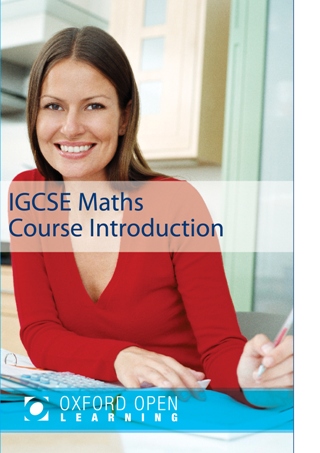- IGCSE Courses
- Biology IGCSE
- Business IGCSE
- Chemistry IGCSE
- Economics IGCSE
- English IGCSE
- English Literature IGCSE
- French IGCSE
- Geography IGCSE
- German IGCSE
- History IGCSE
- Human Biology IGCSE
- Maths IGCSE
- Physics IGCSE
- Science (Double Award) IGCSE
- Science (Single Award) IGCSE
- Spanish IGCSE
- GCSE Courses
- GCSE Business
- GCSE English
- GCSE English Literature
- GCSE Latin
- GCSE Maths
- GCSE Psychology
- GCSE Sociology
Mathematics IGCSE
The Maths IGCSE course gently guides the student through basic mathematical skills, progressing on to more advanced material as the student’s skills and abilities develop. Each lesson begins with a set of clearly stated objectives and an explanation of its place in the overall programme of study. Effective learning is encouraged through frequent activities and self-assessment questions.
IGCSE Maths provides an excellent foundation for:
- Students who want to continue their Maths studies at AS and A Level and beyond
- Students who need mathematics to complement other subjects
- Students who need a final qualification in mathematics
The course enables students to:
- Develop their knowledge and understanding of mathematical concepts and techniques
- Acquire a foundation of mathematical skills for further study in the subject or related areas
- Enjoy using and applying mathematical techniques and concepts to become confident in using Mathematics to solve problems
- Appreciate the importance of mathematics in society, employment and study
Syllabus
Oxford Open Learning’s Maths IGCSE course is designed to prepare students for the Edexcel IGCSE in Mathematics (Specification A, 4MA1) for examination in June 2022 or later years.
It is examined on two levels and you will have the choice of studying for the “F” foundation level where the highest grade is 5 or the “H” higher tier where you can get up to grade 9.
In both foundation and higher tier, assessment comprises two papers marked by Edexcel. Each paper is assessed by a two-hour written examination and each paper is worth 50%.
Free Access to Online Resources
Oxford Open Learning has teamed up with the award winning Twig video site to provide access to online maths resources, specifically filmed to support GCSE level studies. Each maths IGCSE student will get a free login to be able to view the entire Twig world range incorporating thousands of short educational videos. Through out your course you will be referred to specific videos to support your learning and offer greater context to your studies. An annual subscription to Twig world videos would normally cost £99.
Online Course or Paper Based? Additional Tuition? It’s your choice!
All of our GCSE English students receive:
- Traditional printed learning materials
- Access to our online resources with on-the-go access to all your regular lessons
- The support of a fully qualified teacher online and by phone
- You will have the same tutor through your course which will enable you to build a good working relationship. They generally work some evenings and weekends as well as through the holidays.
- You also have the choice of purchasing extra one to one tutor time on an ad hoc basis for those few occasions when you may feel you need it.
Supporting Resources
Maths IGCSE FAQs
The course costs £375. Click for full details of The Oxford Open Learning Trusts GCSE and international GCSE prices
Oxford Open Learning is a long-established educational trust. We take pride in;
- treating every student as an individual
- our friendly and knowledgeable customer service team
- the quality of our courses
- we’re rated ‘Excellent’ on Trustpilot by students who have studied with us.
- we provide online and printed resources so you can study your way – other providers do not give you that choice.
- we make studying your online course easy with our flexible schedule, tutor support, and interest-free payment plan.
Oxford Open Learning is a not-for-profit trust, so you can be sure that your course fees are spent on either your education and tuition or on improving our courses.
Press the “apply now button” and you will find that we certainly do not employ any high-pressure sales techniques. We want you to be comfortable with your choice before committing to a course and so we encourage questions and discussion before you start your journey with us.
Once you are studying, our friendly and experienced staff are always available to give help and advice in person on the ‘phone or by email if you prefer.
You can enrol any time you like, the earlier the better. The important thing to think about is when you wish to sit your exam and to give yourself plenty of time to work through your materials and revise successfully. Our cut-off dates for enrolment are usually November for the following summer exams or March for November sittings.
There are November exams for this subject and the deadline for booking them is the 4th October.
Once you have enrolled, you will get immediate access to your course online and your printed course materials will arrive a few days later.
All the information you need to book your exam with an exam centre can be found in the Student Information section of our website. Here you will find
- detailed instructions on what to do and how to approach exam officers if there is no online booking system
- the entry codes needed to book exams
- our map of examination centres that have helped our students in recent years.
Our experienced Advisers are also always available with a wealth of knowledge about how to locate exam centres and book exams.
OOL students have the advantage of not being tied to sitting with any one centre or organisation and several will offer discounts to our students. Tutors & Exams is one of the biggest operators. They have nine exam venues across the UK in; Birmingham, Bolton, Coventry, Doncaster, High Wycombe, Romford, St Neots, Taunton and Wimbledon.
Our map also shows plenty of other centres that are also very likely to help our students, they may also offer a discount and they could be cheaper. If you have the time it is always worth shopping around.
You should start to look for an exam centre as soon as possible after enrolling and preferably in the Autumn term before your summer exam. There is a lot of demand for Private Exam places and many centres are already booked up well before Christmas. The AQA Exam Board’s final date for booking summer exams without incurring late entry fees is the 21st of February, but do not expect to find many places willing to help at this late stage.
Resit exams are available in November but your choice of centres is likely to be more limited and you will need to confirm arrangements well before the start of the summer holidays.
First fill out our website application form giving as much relevant information as possible and at this stage you have not committed to anything. Once the application has been received and assessed by our Admissions Department, a Student Adviser will contact you to discuss the application, answer any more questions you may have and confirm your subject selections and cost before you get started.
We want you to be comfortable with your choice and clear about the way forward, therefore we do not employ any high pressure sales techniques and you are free to take your time before you commit to investing in any study programme.
Once you are ready, you can pay your Student Adviser in full or arrange to pay in instalments.
There is no upper age limit to studying for a GCSE or IG and we get students who are retired and in their 70’s even 80’s. They often just want to study to keep their brains active and many don’t actually go the expense of sitting the exam. Our tutors love what they can learn from these students
However, most students have just started work and need an extra GCSE or IG to progress or want to switch to a job which requires a qualification they do not have.
If you are under 18 years old then you need our sister company Oxford Home Schooling.
Not surprisingly, many people find the idea of sitting a GCSE or IG with a group of 16 year olds very intimidating but you are quite likely not to be alone.
There is no denying that it can be uncomfortable for a grown up to sit in what is likely to be the cheapest place; a school. Also because of safeguarding, many schools will no longer allow unknown grown ups in to their premises, but there are other options.
The private commercial exam centres all allow grown ups to sit and consequently although you will be in the minority, you will probably not be the only one. Some private schools are still happy to accommodate adults and they will be likely to have the most experienced exam officers.
Exams are not easy for anyone but at least as an adult you will probably have done it before and have the life experience not to panic.
Whether you enter for the foundation or the higher tier is largely a matter of personal choice and depends on your own aspirations. Many Oxford Open Learning students only need to obtain a Grade 4 or 5, for example, to get onto a further education course. If this is the case and you have no love of Maths then you should enter for the Foundation papers. The questions are more straightforward but they do require accurate answers.
If you want to go on and study a course which requires the use of maths, you will probably wish to study the higher tier.
It is worth noting that the Oxford Open Learning Trust, like most educational institutions, only accept students onto a Maths A level course if the student has completed the GCSE at higher tier.
We often find that with maturity and some life experience, even students who could not cope with Maths at school are able to face studying it at home.
You are not under time pressure, you have a tutor to help and there are now thousands of examples on the internet to help explain mathematical problems.
Things that were a complete mystery at school, percentages is often a good example, can suddenly become clear and a minor victory will soon give you the confidence to believe you can do it.





